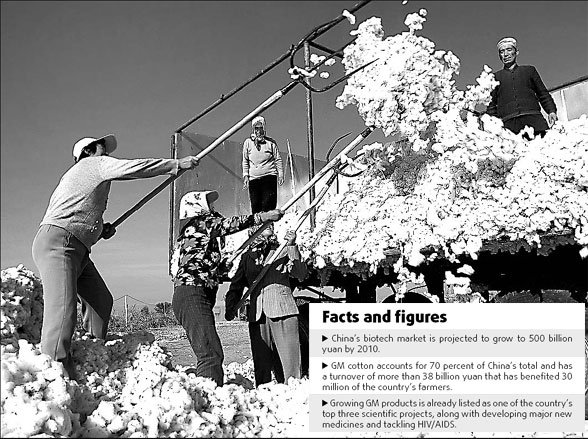Farmers cotton on to biotech industry

Zu Maotang has been planting cotton since 1982, but it took until 1997 for him to make a living from it.
The farmer's crops in Central China's Hubei Province yielded just 15 to 25kg of cotton per 0.15ha before 1997. Last year his harvest reached 250 kg per 0.15 ha.
Introducing insect-resistant, genetically modified cotton developed by Chinese scientist Guo Sandui helped Zu expand his crop area to 18 ha last year, from 0.2 to 0.27 ha in the 1980s. His crops reaped net profit of about 100,000 yuan.
Chinese scientists and biotech companies have found an ally in Zu in their battle to bring GM plants to the country, whose biotech market is projected to grow to 500 billion yuan by 2010.
And Zu now lives a much better life. The country's farmers earned less than 638 yuan each on average last year. While politicians and environmentalists are still entangled with scientists and biotech firms over the pros and cons of GM foods, China's farmers are already starting to benefit from the transgenic plants, says Guo, a scientist with the Chinese Academy of Agricultural Sciences (CAAS).
GM cotton accounts for 70 percent of the country's total and has a turnover of more than 38 billion yuan that has benefited 30 million of the country's farmers.
Biotech has become the "strategic choice" for the country's agricultural industry, says Huang Dafang, director of a biotech lab under the Ministry of Agriculture.
"It's a miracle that China uses 7 percent of the world's total arable lands to produce 25 percent of the world's food supplies and feed 20 percent of the world's total population," he says.
"But it's unsustainable, as China's arable lands and water are dwindling while the population continues to rise."
State Councilor Chen Zhili said in June that growing GM products is already listed as one of the country's top three scientific projects, along with developing major new medicines and tackling HIV/AIDS.
The government's bet on biotech could be a leg-up for supporters of GM foods in the battle with environmentalists and European politicians.
Environmental groups such as Greenpeace claim GM foods could be unsafe and harm the environment. Supporters say many GM crops, including the insect-resistant cotton, are more environmentally friendly as they reduce the use of pesticides.
"The early concern of opponents about biotech has not become a significant problem anywhere in the world," says Harvey Glick, director of Scientific Affairs at US biotech company Monsanto Co.
In June, the European Food Safety Authority's GMO panel rejected toxicity concerns in rats fed GM maize from Monsanto, a major victory for the US firm.
The United States is the world's largest manufacturer and exporter of GM corn.
But in China, biotech companies and scientists are fighting growing fears about GM crops. "It's fading in many parts of the world, but not in China," says Glick.
A survey by market researcher Ipsos China earlier this year found 65 percent of Chinese respondents would not choose GM foods.
Chinese regulators require all GM foods sold in the country to be labeled as such. But some manufacturers and sellers are labeling non-GM foods as "GM-free" to give consumers the impression that GM foods are unsafe.
"That is a distorted perception. All the GM foods approved by the government should be safe," says Jia Shirong, a researcher with CAAS, adding that most of the soybeans imported to China are transgenic.
In China there have been concerns that GM foods could alter the genetic transformation of humans. Jia dismisses that as "scientifically ridiculous", adding the "unreasonable" fear about the safety of GM foods is already hurting the competitiveness of China, a biotech pioneer among developing countries.
Jia has been developing GM rice for 10 years, but the government has yet to give the green light for its commercial use.
"If it had been approved earlier, China could have got an upper hand in the global market," says Jia. China has approved the commercial use of transgenic cotton, poplar and papaw.
Jia says transgenic corn has become a trade issue. "Europe has been opposing GM foods as it has been setting up technical trade barriers to defend its lagging agriculture industry," he says.
France, Germany, Italy and Austria have blocked imports of rice products from China since last September, claiming they were polluted by GM rice.
An investigation by the Ministry of Agriculture found two companies based in Wuhan, in Central China's Hubei Province, produced seeds without government approval. The two firms were later fined.
"As long as the regulations on GM plants and foods are implemented effectively, all the approved GM foods will be safe," says Luo Yunbo, a professor with China Agricultural University, which was designated by the government to review and test the security of GM foods.
(China Daily 09/11/2007 page15)














